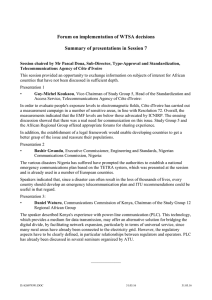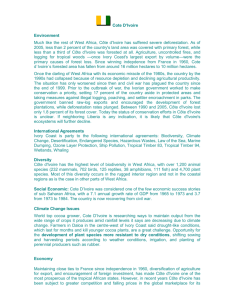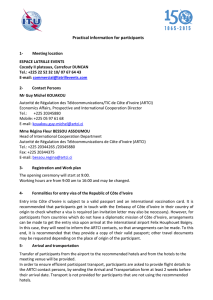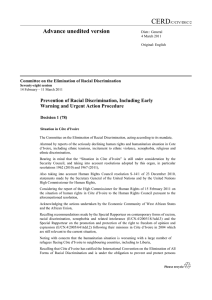ADVANCE QUESTIONS TO COTE D’IVOIRE BELGIUM
advertisement
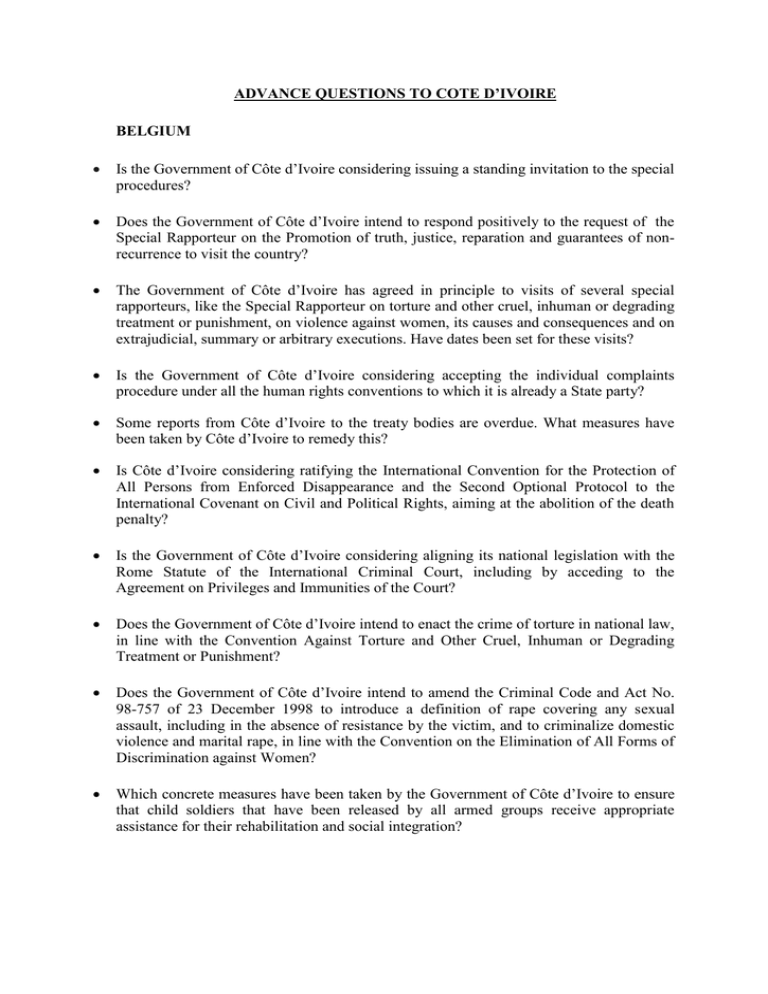
ADVANCE QUESTIONS TO COTE D’IVOIRE BELGIUM Is the Government of Côte d’Ivoire considering issuing a standing invitation to the special procedures? Does the Government of Côte d’Ivoire intend to respond positively to the request of the Special Rapporteur on the Promotion of truth, justice, reparation and guarantees of nonrecurrence to visit the country? The Government of Côte d’Ivoire has agreed in principle to visits of several special rapporteurs, like the Special Rapporteur on torture and other cruel, inhuman or degrading treatment or punishment, on violence against women, its causes and consequences and on extrajudicial, summary or arbitrary executions. Have dates been set for these visits? Is the Government of Côte d’Ivoire considering accepting the individual complaints procedure under all the human rights conventions to which it is already a State party? Some reports from Côte d’Ivoire to the treaty bodies are overdue. What measures have been taken by Côte d’Ivoire to remedy this? Is Côte d’Ivoire considering ratifying the International Convention for the Protection of All Persons from Enforced Disappearance and the Second Optional Protocol to the International Covenant on Civil and Political Rights, aiming at the abolition of the death penalty? Is the Government of Côte d’Ivoire considering aligning its national legislation with the Rome Statute of the International Criminal Court, including by acceding to the Agreement on Privileges and Immunities of the Court? Does the Government of Côte d’Ivoire intend to enact the crime of torture in national law, in line with the Convention Against Torture and Other Cruel, Inhuman or Degrading Treatment or Punishment? Does the Government of Côte d’Ivoire intend to amend the Criminal Code and Act No. 98-757 of 23 December 1998 to introduce a definition of rape covering any sexual assault, including in the absence of resistance by the victim, and to criminalize domestic violence and marital rape, in line with the Convention on the Elimination of All Forms of Discrimination against Women? Which concrete measures have been taken by the Government of Côte d’Ivoire to ensure that child soldiers that have been released by all armed groups receive appropriate assistance for their rehabilitation and social integration? CZECH REPUBLIC Does the Government of Côte d'Ivoire consider acceding to the Optional Protocol to the Convention against Torture and Other Cruel, Inhuman or Degrading Treatment or Punishment as the Czech Republic recommended already in 2009? Does the Government intend to incorporate in the national legislation a specific individual offence criminalizing torture, and a definition of torture? If so, when? How is the right to participate in the political life granted to internally displaced persons (IDPs)? Has the Government implemented or has the intention to implement the recommendation of the Special Rapporteur on the human rights of IDPs as regards the facilitation of the participation of IDP communities in the process of land reform? What measures have been taken to protect freedom of expression of all relevant stakeholders, including representatives of opposition political parties, journalists and human rights defenders? Has the Government implemented recommendations of international election observation missions observing the 2010 presidential elections, especially the ones related to equal political participation? GERMANY With presidential elections scheduled for 2015, what preparatory measures is Côte d’Ivoire taking to ensure elections will be conducted in a free, fair and transparent manner and in respect of every citizen’s right to participation? Is the state taking steps to reform the Independent Electoral Commission and when would such a reform be implemented? Which measures have been or will be undertaken to ensure the electoral list is up to date? Regarding judicial investigations into post-election violence, when are the trials for defendants held in pretrial detention expected to begin? With respect to the defendants accused of crimes in connection with the violent unrest of 2010/2011, that were released from pretrial detention last year, is the state still planning to put them on trial? What steps does Côte d’Ivoire intend to take to ensure that all perpetrators of crimes during that period are adequately prosecuted? During the first UPR cycle, Côte d’Ivoire accepted the recommendation to implement the country’s law on rural land tenure. What have been the main obstacles in this regard and how is Côte d’Ivoire planning to overcome them? Does the state intend to contribute to the resolution of land disputes by supporting local structures and by providing assistance to internally displaced persons who are unable to access their MEXICO What measures have been adopted to strengthen and support the efforts to ensure the right and access to education for migrant and asylum-seeking children? How the consultations procedures between the central government and the Sami Parliament take place? How the indigenous populations participate in the usagee of land and natural resources belonging to them? How the government ensures in its arms trade regulations that these do not reach actors suspected of committing human rights violations or abuses? NETHERLANDS Could the government of Cote d’Ivoire provide more information on the efforts to implement Act No. 2013-33 and to end gender discrimination? Is the government of Cote d’Ivoire willing to reconsider the initiative to raise awareness on discrimination based on sexual orientation or gender identity. Is the government of Cote d’Ivoire planning on taking steps to ensure equal right for LGBT and protect them from discrimination? To what extend has the government of Cote d’Ivoire follow-up the recommendation of the National Human Rights Commission (in 2009) aimed at strengthening its effectiveness, autonomy and independence in conformity with the Paris Principles? NORWAY Concerns have been expressed about the situation in Côte d’Ivoire with regard to cases of arbitrary detention, as well as related to the capacity, availability, affordability and the independence of the courts. What strategy does the government of Côte d’Ivoire have to reduce cases of pre-trial detentions and to increase access to fair trial? We wish to compliment on efforts made by the Government of Côte d’Ivoire to combat child labour including trafficking. Which reporting mechanisms and result management systems have been put in place to ensure results according to targets set? What is the current status on the implementation the Convention on the Elimination of All Forms of Discrimination against Women, ratified by Côte d’Ivoire, into the national legislation SLOVENIA In your national report you point out that while there is no prohibition under the law of any relations between consenting adults in Côte d’Ivoire, still the wider public cannot accept recognition of the same-sex relations. Has the Ivorian government done any specific awareness raising regarding the rights of LGBTI rights? Concerning the accepted, yet not fully implemented recommendation of Slovenia from the first UPR cycle regarding the finalization of the national action strategy to combat sexual violence, we would like to ask the Ivorian delegation in what stage the strategy is currently held? SWEDEN What measures is the Government of Côte d’Ivoire taking to stop and prevent all kinds of violence against women and girls, including rape, domestic violence and female genital mutilation? Could the Government of Côte d’Ivoire elaborate on the measures it has taken and will take in order to assure impartial justice and to fight impunity, including its cooperation with the International Criminal Court? UNITED KINGDOM What plans does the Government of Cote d’Ivoire have to fully align its national legislation with the Rome Statute of the International Criminal Court (ICC)? What measures will the Government of Côte d’Ivoire take to ensure those responsible for abuses committed during the conflict following the presidential elections of 2010 will be brought to justice regardless of their political affiliations and will this be done in cooperation with ICC investigations? What steps will the Government of Côte d'Ivoire take to follow-up the recommendations of the National Commission of Inquiry (July 2012) in order to avoid repetition of violence in the presidential elections of 2015, particularly intercommunity conflict? Will the Government of Côte d'Ivoire develop a comprehensive transitional justice strategy that will encompass accountability, reparations, security sector reform and judicial reform to foster national reconciliation? What legal measures will be put in place by the Government of Côte d’Ivoire to bring to justice those perpetrators who have committed acts of sexual violence, rape or female genital mutilation?
